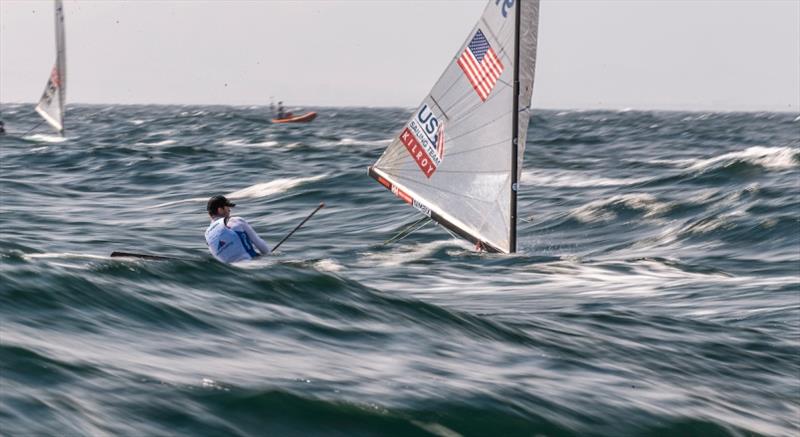
Tough sailing at the Hempel World Cup Series Enoshima for American and Canadian sailors
by David Schmidt 4 Sep 2019 01:00 AEST
August 25-September 1, 2019

Luke Muller - Hempel World Cup Series Enoshima, day 3 © Pedro Martinez / Sailing Energy / World Sailing
Seasons are curious things. Here in the USA, Labor Day Weekend, not the autumnal equinox (September 23, 2019), marks summer's unofficial end, fall's unofficial start, and, during general-election cycles, the start of the serious political season.
But for sailors looking to compete and medal at next summer's Tokyo 2020 Olympics (July 24-August 9, 2020), September 1 also marked the final day of Hempel World Cup Series Enoshima (August 25-September 1), which is the final large Olympic class regatta of 2019 and the last of World Sailing's World Cups until January 2020. More importantly, it also marks less than 11 months until the starting guns begin sounding at the next Olympic regatta, and a time when serious medal candidates need to be showing their tactical strengths and big-fleet speed.
Unfortunately for North American sailors and their flag-waving fans, there was no danger of hearing O Canada or the Star-Spangled Banner at the awards ceremony at the Hempel World Cup Series Enoshima, as the best finish that any American or Canadian sailor achieved was a seventh place in the Men's Finn, which was earned by Tom Ramshaw (CAN).
The top finish by US sailors was an eighth-place finish in the Men's 49er, posted by Andrew Mollerus and Ian MacDiarmid. Sisters Atlantic Brugman Cabot and Nora Brugman finished in tenth place in the Women's 470 class, and Luke Muller also finished in tenth place in the Men's Finn.
While it's nice to be able to write about Top Ten finishes, less than 11 months out from the start of the next Olympic regatta, I'll admit that the temperature in my office feels a bit hot for what is (symbolically at least) autumn's grand opening.
After all, as a journalist at the London 2012 Olympics I had a front-row seat to the first medal-ceremony shutout that the American team, which is one of the most decorated countries in Olympic sailing (the UK has more gold medals, but we hold more medals in total), has suffered since the Berlin 1936 Olympics.
Trust me when I say the view (and it's aftermath) wasn't pretty.
But, it's important to remember that the wind-up to that tough performance was entirely different than the drubbing that the team just suffered in Japan at the World Cup Series Enoshima. Careful sailing historians will remember the 2011 ISAF Worlds (now World Sailing), which took place on the waters off of Perth, Australia, where three American-flagged teams realized Top Three finishes (Anna Tobias [nee Tunnicliffe], Molly O'Bryan Vandemoer and Deborah Capozzi, sailing in the Women's Elliot 6m finished in first place; Paige Railey, sailing in the Women's Laser Radial, finished in third place, and Mark Mendelblatt and Brian Fatih finished in third place in the Star class).
While it was a proud day reporting these great finishes, the results, just nine months later on the waters off of Weymouth, UK, proved devastating for American interests.
So, while I'm trying hard not to read too deeply into the results from the Hempel World Cup Series Enoshima, I can't shake something that Malcolm Page (AUS), US Sailing's chief of Olympic sailing, told me in a recent interview.
"Statistically, those who win World Championship medals often have good chance at winning Olympic medal as well," said Page. "Of the Rio 2016 Gold Medalists, 100% had won a World Championship medal as well. 73% of the Silver and Bronze Medalists in Rio had one World Championship medals as well."
Page should know. As a two-time Olympic Gold medalist and a three-time 470 World Champion (as well as a two-time Silver medalist at the 470 Worlds and a one-time 420 World Champion... we barely even need to count his still-proud Bronze-medal finish at the 2001 470 Worlds), the man has clearly stared-down his share of world-class competition and understands the upwards performance trajectories that winning teams need to own in the ramp-up to the Olympics.
The next World Sailing World Cup Series event is set to unfurl on the waters off of Miami, Florida, from January 19 to January 26, 2020. While the 2011 ISAF Worlds prove that dominance at a World Cup-level event doesn't ensure medal-ceremony success come the Olympic Games, according to Page, there's clear evidence that the inverse also holds true, and that if North American sailors aren't in the hunt now, next summer could prove to a flashback to 2012, or worse, 1936.
May the four winds blow you safely home,
David Schmidt
Sail-World.com North American Editor